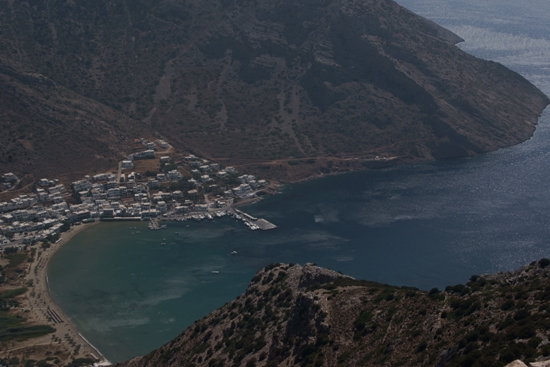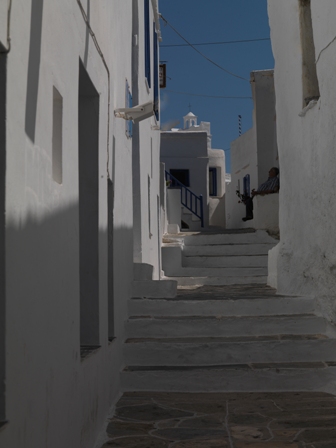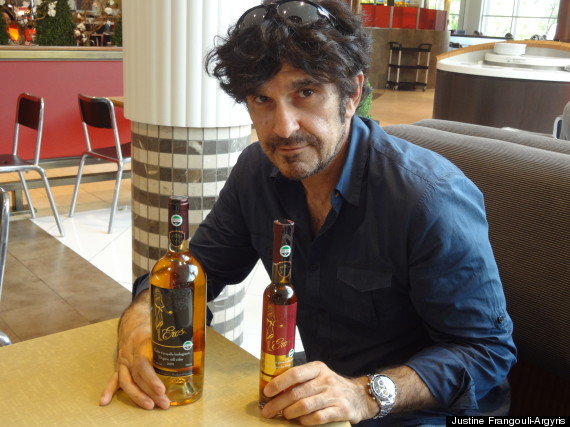

Photos :Courtesy Vangelis Rassias
Justine Frangouli-Argyris
The Huffingon Post
Greece is a country of many islands, each boasting its own unique morphology, architecture and culture. The Cyclades, a group of twelve remote islands in the midst of the Aegean Sea surrounding the sacred island of Delos in a circular formation, are renowned for their "jet-set" destinations of Mykonos, Santorini and Paros.
However, it is well worth the effort to venture "off the beaten track" and visit some of the lesser known jewels of this Aegean archipelago. For, it is here, where the tourist masses have yet to establish a presence, that the visitor can discover the true splendor of the Cyclades.
This summer, I was fortunate to land on the hidden paradise of Sifnos, an island of wild beauty yet, at the same time, with a unique nobility. Hugging the sea but sporting steep mountains that stand naked in its midst, Sifnos immediately attracts for the ruggedness of its spectacular scenery.
Apollonia, the capital, with its classic white-washed houses dotted with Aegean blue and other soft shades that blend to form a soothing pallette, appears as if perched on a ledge, overhanging the ocean and offering an unforgettable panoramic view.
Artemonas, with its cobbled streets and predominantly larger structures, stands proud in its urban nobility. The expansive residences, with their large fenced yards, are pristine examples of Greek Neoclassical architecture. The wealth of the local churches, with their important byzantine icons and frescoes, are proof of the town's financial superiority, owing to its historical ties with the shipping trade.
The Kastro, a past capital featuring medieval fortifications, is, perhaps, the island's most picturesque village, resembling a living museum and overlooking the tiny cove of Seralia with its tiny fish restaurants.
Sifnos may not be blessed with a panoply of beaches like some of its more renowned neighbors, but it posesses a few very beautiful and easily accessible ones that house good services. The extensive Platis Yialos, for example, has fine, dark sand and brandishes small hotels and beach bars that offer parasols and lounge chairs at water's edge.
At the less-organized Vathy, where many yauchts are docked, the transparent waters allow the wader to gaze at the teeming marine life underfoot and to enjoy the sight of the quaint fishing village across the bay.
The sandy beach at Kamares, with its calm waters, is home to many shops, bars and cafés and doubles as the official port of the island, where the visitor is first welcomed.
Over the course of the summer, Sifnos hosts many cultural events. A splendid affair to which I was invited, the 7th annual Festival of Cycladic Tasting, is a three-day gastronomic exposition of Cyclades delicacies, many of which I had no idea were purely Greek in origin.
An intricate part of the celebrations is an event organized by the Cultural Association of Sifnos. "Sifnos makes the table," is dedicated to the memory of the famous Greek chef, Nikos Tselemendes. Born in the town of Exambela, Tselementes went on to international stardom by showcasing the flavors and products of his beloved Cycladic cuisine.
On exhibit were twenty separate kiosks, each displaying local agricultural specialties and offering up appetizers, indigenous wines, and Sifnian pastries. Visitors could even partake in the many cooking demonstrations that were a sight to behold.
The evenings were capped off in the central square of Artemona where local music abounds and island dance troupes performed. A stunning highlight was the annual reincarnation of the traditional Sifnian wedding that originated at the home of Tselementes and weaved its way through the narrow streets to the great square, signalling the conclusion of the festivities.
"Apart from traditional food, the Cycladic islands proudly display local agricultural produce chiefly cultivated by a new class of young entrepreneurs trying to succeed in a country that has been devastated by the economic crisis," confessed to me the President of the Cultural Association of Sifnos, Maria Nadalis.
For his part, Mayor Andreas Babounis hopes that the festival will continue to flourish and eventually become international in scope. "Our aim is to further communication and networking amongst the Cyclades and every year we invite representatives from some other island groups in order to promote interaction between our individual cultures. Our ultimate goal, however, is to give a wider connotation to the event and, at some point in the future, have European participants showcasing their cuisines."
Sifnos, the island known for its chick pea soup, or "revythada," and local wild sheep, or "mastelo," is, truly, a rare paradise that captivates with its wild beauty and offers the best of the reputed Aegean good life.
Follow Justine Frangouli-Argyris on Twitter: www.twitter.com/Justinakion







